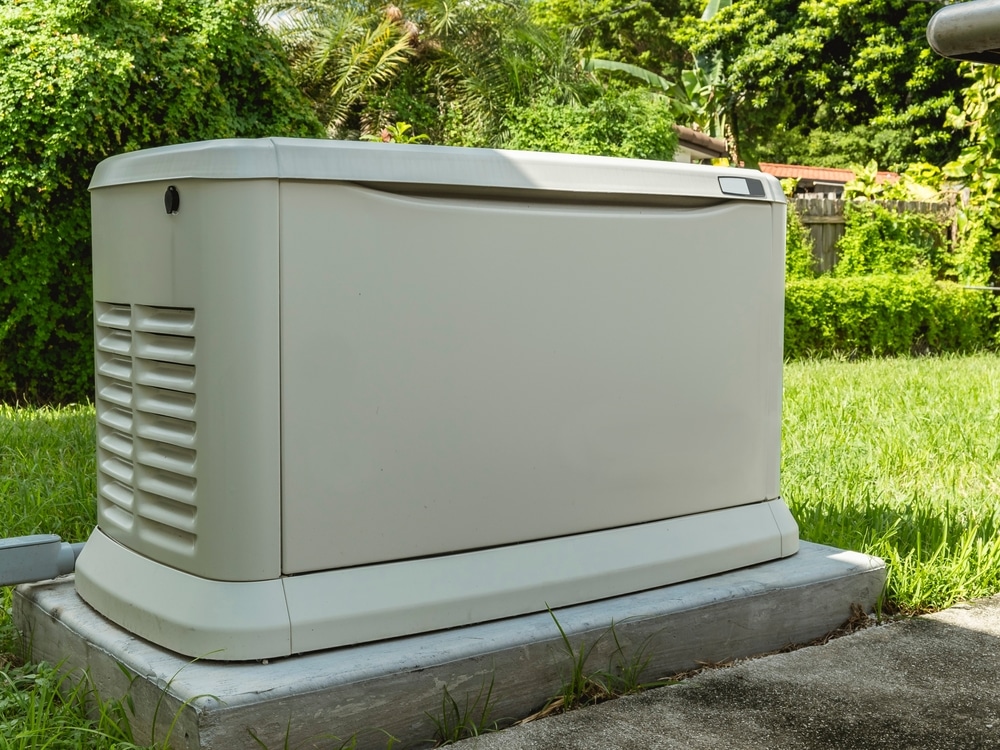
Generators provide uninterrupted power supply during outages, making them extremely beneficial to homeowners. However, as important as generators are, they produce a loud hum that can be bothersome and distracting.
The good news is that you can take steps to minimize noise emissions from your generator. Keep reading to learn more about how to soundproof your residential generator.
What are the Sources of Generator Noise?
The sound coming from your generator has various sources. Understanding these noises can aid in effectively mitigating them.

Vibrations
When mounted on a concrete pad, the mechanical vibrations of a running generator can transmit sound through surfaces, amplifying the noise further.
Engine Noise
The engine converts fuel into mechanical energy and produces sound as a byproduct of mechanical motion and combustion. The intensity of the noise is based on the size of the engine.
This means larger engines with a higher power output are more likely to produce more noise than smaller engines. The noise made by the engine can also be due to factors such as loose components, mechanical knocking, and wear and tear of parts.
Cooling System Noise
Air cooling systems use fans to create airflow that keeps the generator cool and prevents overheating. The fans generate noise as they blow air across the engine.
Additionally, airflow created by the fans moves at high speed, causing turbulence and vibrations in surrounding parts, such as the silencer shell and cooling unit fan cover, which are then heard as noise.
Exhaust System Noise
As the generator’s engine burns fuel, it produces harmful gases that must be discharged. The exhaust system collects and safely removes these gases from the generator.
It comprises various parts: the exhaust manifold, muffler, and exhaust pipe. The exhaust manifold collects gases as they leave the engine cylinders.
Then, the gases pass through the muffler, which reduces noise levels and filters out matter. From there, the gases move through the exhaust pipe, where they exit the generator.
Gases flowing through the exhaust pipe can produce noise. Moreover, wear and tear of the muffler can prevent it from effectively reducing the noise, leading to an increase in exhaust noise.
How Can You Make Your Generator Quieter?
Here are some of the ways to make your residential generator less noisy and enhance your overall experience:
Strategic Placement

A simple yet often overlooked way to minimize the noise from your generator is to position it as far away from the house as possible. The further away the generator is, the less noise you’ll hear.
If you can relocate your generator, you may find it helps reduce the noise. However, ensure the spot you choose doesn’t inconvenience your neighbors.
Increasing the distance between your home and the generator enables the wavelengths to disperse over a greater distance, which reduces the sound intensity, decreasing noise considerably.
Acoustic Barrier
An acoustic barrier is an enclosure that acts as a barrier between your generator and the surroundings, limiting noise emissions. The height and material of the barrier play a crucial role in its effectiveness.
Hard surfaces such as concrete walls and generator canopies reflect sound waves, reducing noise transmission. You can construct or purchase a barrier to create a quieter environment.
With barriers, it’s essential to account for access for maintenance, room for airflow, and exhaust ventilation while still maintaining sound reduction.
A generator produces considerable heat and requires proper airflow to avoid overheating.
It needs at least 3 feet of space on every side to dissipate heat, ensuring adequate cooling. The generator also requires sufficient ventilation to avoid the accumulation of harmful gases such as carbon monoxide.
Additionally, the barrier shouldn’t restrict access to the generator for regular checks and maintenance. Its design should allow for safe and easy access.
Acoustic Insulation
If the generator is still too loud, lining the hard surfaces of the generator enclosure with acoustic insulation can make a big difference.
An acoustic barrier insulated with mass-loaded vinyl, fiberglass, or acoustic form absorbs and dampens noise emissions from the generator. This allows you to enjoy continuous power supply without the headache of generator noise.
Cooling Air Attenuation
Attenuation baffles installed into air inlets and outlets can drown the noise the cooling air produces as it passes across the engine and through the radiator, providing a more peaceful environment.
Replace the Muffler
The generator’s motor produces the most noise, which is expelled through the exhaust. Most residential generators are fitted with exhaust mufflers to decrease the overall sound output.
However, an outdated muffler can cause your generator to run louder than normal. Consider installing a new muffler specifically designed for noise reduction.
Regular Maintenance
Dirty air filters, worn-out or damaged parts, and loose components can increase noise. Professional, routine maintenance improves the performance of your generator and keeps noise levels down.
Routine maintenance, which includes tightening up loose parts, changing the oil and filters, replacing worn-out components, lubricating moving parts, and servicing the exhaust system and engine, minimizes any potential noise due to mechanical woes.
Use Sound Attenuators
Attenuators are large enclosures made of steel with sound-absorbing insulation inside. They have splitters, which are perforated sheet metal pieces that allow air to pass through while absorbing sound, reducing noise transmission.
Sound attenuators are built based on your generator’s size and specific sound attenuation requirements.
Add Anti-Vibration Mounts
Vibrations from a generator contribute to a significant amount of noise. Hard surfaces such as concrete can amplify these vibrations.
Positioning anti-vibration mounts under the generator helps absorb and dampen vibrations so that they’re not transferred to the hard concrete base, limiting noise at the source.

Anti-vibration mounts are available in different options, including dampers, spring mounts, and rubber mounts. The ideal choice will depend on the noise reduction level you want to achieve.
Change Your Landscaping
Thick vegetation is a natural and effective sound barrier that allows you to combine aesthetics and functionality. You can significantly lower your generator’s noise output by planting thick, evergreen hedges, shrubs, and trees around the generator area.
Remember to leave enough room for cooling when changing your landscape. Residential generators require a distance of at least 3 feet all around.
Ask the Experts
Consider consulting with a generator specialist. They can recommend appropriate solutions to make your generator quieter.
Do you want to learn more about how to soundproof your residential generator? Contact the professionals at Pow’r Point in Saco, ME, today!





